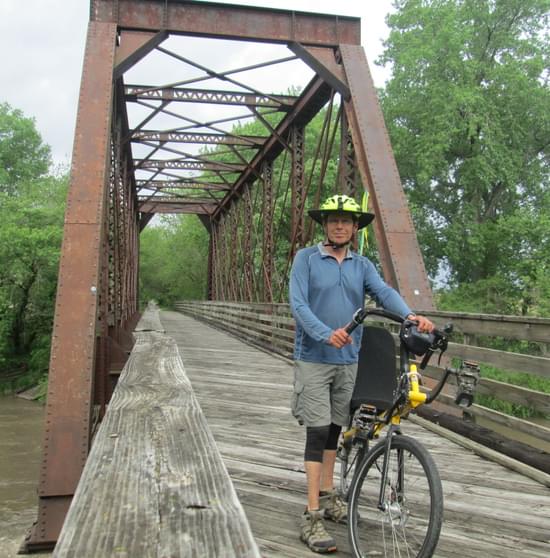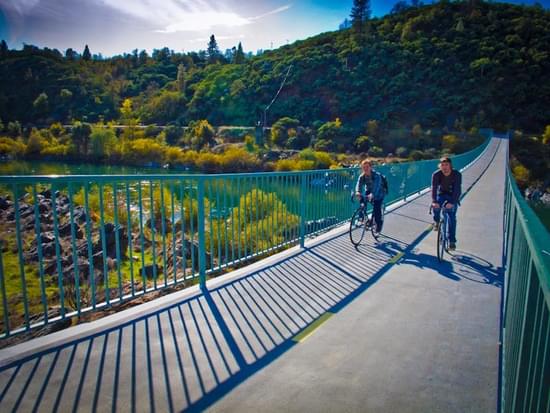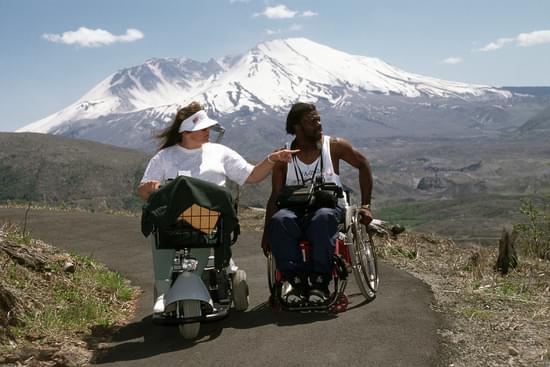




Bringing together the collective force of American Trails members, partners, and allies
Coordinating advocacy efforts will benefit all Americans through strong, coherent, and coordinated messaging on legislation and policy. It’s anticipated that American Trails members will engage jointly in advocacy efforts before Congress and federal agencies to influence trail legislation, policy, and funding.
American Trails, through our Trails Move People (TMP) coalition, will allow robust engagement of diverse organizations across the trail user spectrum on a variety of topics and issues related to trails. Agreement on all issues may not be possible, but TMP will provide a forum for such discussions, and allow the trails community to speak loudly with a unified voice on the issues that resonate with the TMP coalition.
Solve the Maintenance Backlog. Sadly, much of the infrastructure that outdoor recreation depends on — including trails, marinas, campgrounds and more — is worn-out or desperately in need of renovation and expansion.


Ensure adequate funding for trails infrastructure on Federal lands. On behalf of the thousands of diverse trail users our collective organizations represent, we urge appropriators to adequately invest in our nation’s trails.
We are committed to advancing Justice, Equity, Diversity, and Inclusion (JEDI) principles in outdoor recreation. We are leading efforts at local, state, and federal levels to increase access to outdoor recreation for those who have historically been marginalized, underrepresented, or excluded from many outdoor spaces.

Trails have an out-sized role to play advancing Justice, Equity, Diversity, and Inclusion (JEDI) principles in outdoor recreation. We recommend support and consideration by Congress of the following bipartisan legislation and proposals that include JEDI provisions.
Outdoor Recreation Legacy Partnership Grant Program Act, H.R. 1334
Utilizes funding from the Land and Water Conservation Fund (LWCF) to fund the creation of public open space in underserved communities with the goal of having outdoor space within 10 minutes of all communities.
Transit to Trails Act, H.R.4273
Provides federal grants to match state funding of transit routes between urban and rural cities and public lands to ensure underserved communities are provided with the health, educational, and recreational benefits of trails, parks, and green spaces.
Recreation Not Red-tape Act, H.R. 3458 and S.1967
Among other provisions to facilitate access to the outdoors, the bill will make it easier for Congress to identify new National Recreation Areas. National Recreation Areas will provide a tool to protect accessible, front country areas, including those in proximity to urban centers providing more outdoor recreation opportunities for urban low-income communities and other communities that have traditionally lacked access to many green spaces.
Simplifying Outdoor Access for Recreation (SOAR) Act, H.R. 3879 and S. 1665
The SOAR Act will increase opportunities for guided recreation on public lands by improving the outfitter-guide permitting systems of the federal land management agencies. By expanding guided recreation, we provide more opportunities for first time visitors to experience public lands in a positive way and help them develop lifelong connections to the outdoors.
Restore our Parks Act, H.R. 1225 and S. 500
Please support immediate passage of this legislation to address the deferred maintenance and repair backlog of our National Parks, U.S. Fish and Wildlife Service, and Bureau of Land Management, and be favorable to any amendments that would include the maintenance backlog of the US Forest Service.
Connecting America’s Active Transportation System Act, H.R.5696
Please support an exciting new bill that provides dedicated federal funds for desperately needed, connected active-transportation infrastructure throughout the United States.
Recreational Trail Program (RTP) Full Funding Act, H.R. 5797
Funded by $270M in federal taxes on off-highway vehicle gas purchases, RTP provides funding to states to develop and maintain trail infrastructure. The Federal Highway Administration estimates that the program is funded at a third of the amount—$85 million annually— that off-road vehicle users pay into the Highway Trust Fund.
Encourage greater use of public-private partnerships
Consider requiring federal agencies to submit requests to the public to operate, improve, or fund outdoor recreation assets with insufficient funding prior to closure — unless there is an imminent health or safety threat.
Promote conservation service corps building recreation infrastructure
We encourage you to continue this focus and make the additional investments necessary to carry its intent forward and put more young adults and veterans to work on the thousands of unmet needs on our public lands.
National Forest trails benefit everyone and receive increasing public use each year. Collectively, the National Forests provide 158,000 miles of trails for activities ranging from hiking, biking, horseback riding, off-highway vehicle usage, groomed winter trails for cross- country skiing and snowmobiling, and access points for water trails. Yet this trail system is increasingly stressed and maintenance cannot keep pace with the growing demand due to inadequate funding.
National Parks and the world-class experiences their 18,844 miles of trails provide are one of the most unifying forces in America. Well-maintained trails improve the quality of visitor experiences and enhance visitor safety. The National Park Service has administrative responsibility for 23 National Scenic and Historic Trails established by Congress. Adequate funding is essential for keeping these popular trails accessible to the public.
The BLM manages 13,468 miles of trails over 245 million surface acres in the United States— more than any other federal land management agency. More than 120 urban centers and thousands of rural towns are located within 25 miles of BLM lands.
Located in every U.S. state and territory, and within an hour’s drive of nearly every major U.S. city, National Wildlife Refuges provide incredible opportunities for outdoor recreation, including hiking, hunting, fishing, birding, boating, and nature photography across 2,100 miles of trails. More than 37,000 jobs are reliant on refuges.
10,355 views • posted 02/28/2020